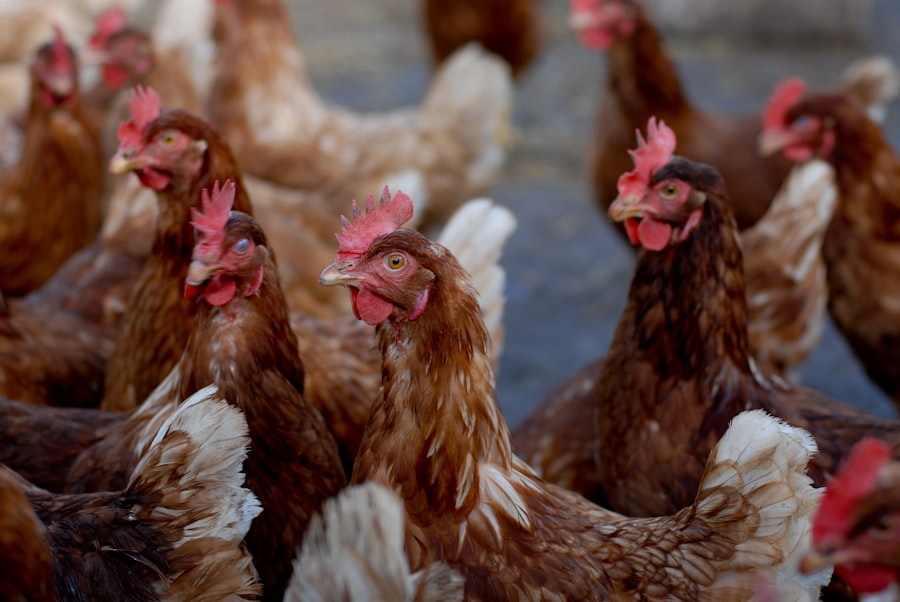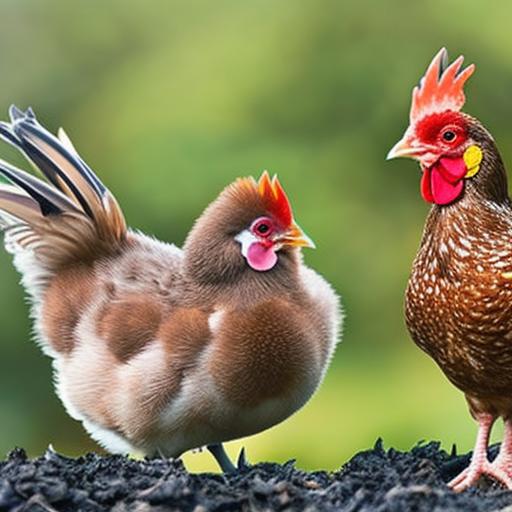Keeping chickens for eggs has become a popular trend in recent years, as more and more people are realizing the benefits of having their own fresh eggs right in their backyard. Not only do fresh eggs taste better and have higher nutritional value, but keeping chickens for eggs also allows you to save money and reduce your environmental impact. In this article, we will explore the benefits of keeping chickens for eggs, factors to consider before choosing chickens, and the characteristics and egg-laying capabilities of different breeds.
Key Takeaways
- Keeping chickens for eggs is a rewarding and sustainable hobby that can provide fresh, nutritious eggs for your family.
- Before choosing chickens for eggs, consider factors such as breed, climate, space, and egg-laying capacity.
- Rhode Island Reds are a popular breed for their hardiness, productivity, and friendly temperament.
- Leghorns are known for their high egg production and adaptability to different climates, but may require more space and attention.
- Plymouth Rocks, Sussex, and Ameraucanas are other popular breeds with unique characteristics and egg-laying abilities.
- Building a chicken coop is essential for providing a safe and comfortable environment for your egg-laying hens.
- Ultimately, the best chickens for your egg-laying needs will depend on your personal preferences and circumstances.
Benefits of Keeping Chickens for Eggs
One of the main benefits of keeping chickens for eggs is the nutritional value of fresh eggs. Fresh eggs are higher in vitamins and minerals compared to store-bought eggs, as they are not subjected to long periods of storage and transportation. They also contain higher levels of omega-3 fatty acids, which are essential for heart health. Additionally, fresh eggs have a richer flavor and a brighter yolk color, making them a favorite among food enthusiasts.
Another advantage of keeping chickens for eggs is the cost savings. While there is an initial investment in setting up a chicken coop and purchasing the chickens, the long-term cost of producing your own eggs is significantly lower than buying them from the store. You can also control the quality of the feed given to your chickens, ensuring that they are getting a healthy diet without any additives or chemicals.
Backyard chicken keeping also has environmental benefits. By producing your own eggs, you are reducing your carbon footprint by eliminating the need for transportation and packaging associated with store-bought eggs. Additionally, chicken manure can be used as fertilizer for your garden, reducing the need for chemical fertilizers.
Factors to Consider Before Choosing Chickens for Eggs
Before choosing chickens for egg-laying, there are several factors that need to be considered. First and foremost is space. Chickens require enough space to roam around and exercise, so it’s important to have a backyard that is suitable for them. It’s also important to check local regulations and restrictions on keeping chickens, as some areas may have specific rules regarding the number of chickens allowed or the type of coop required.
Climate is another important factor to consider. Different breeds of chickens have different temperature tolerances, so it’s important to choose a breed that is suitable for your climate. Some breeds are more cold-hardy, while others are better suited for hot climates.
Lastly, it’s important to consider the egg-laying capabilities of different breeds. Some breeds are known for their high egg production, while others may lay fewer eggs but have other desirable characteristics. It’s important to choose a breed that aligns with your needs and preferences.
Rhode Island Red Chickens
Rhode Island Reds are one of the most popular breeds for egg-laying. They are known for their excellent egg production, with each hen laying around 200-300 brown eggs per year. Rhode Island Reds are also known for their hardiness and ability to adapt to different climates, making them a great choice for backyard chicken keepers.
One potential drawback of keeping Rhode Island Reds is their tendency to be aggressive towards other chickens. They can be territorial and may not get along well with other breeds. Additionally, Rhode Island Reds can be prone to certain health issues such as respiratory problems and feather picking.
Leghorn Chickens
Leghorns are another popular breed for egg-laying. They are known for their high egg production, with each hen laying around 280-320 white eggs per year. Leghorns are also known for their active and independent nature, making them great foragers and excellent at finding their own food.
One potential challenge of keeping Leghorns is their flightiness and skittishness. They can be easily startled and may not be as friendly or docile as other breeds. Additionally, Leghorns are not as cold-hardy as some other breeds, so they may require additional protection in colder climates.
Plymouth Rock Chickens

Plymouth Rocks, also known as Barred Rocks, are a popular breed for both meat and egg production. They are known for their friendly and docile nature, making them great for families with children. Plymouth Rocks lay around 200-280 brown eggs per year.
One potential drawback of keeping Plymouth Rocks is their tendency to go broody. Broodiness is when a hen becomes determined to sit on her eggs and hatch them, which can disrupt egg production. However, some backyard chicken keepers appreciate this trait as it allows them to hatch their own chicks.
Sussex Chickens
Sussex chickens are known for their versatility and adaptability. They come in a variety of colors and patterns and are known for their excellent egg production. Sussex hens lay around 250-300 brown eggs per year. Sussex chickens are also known for their calm and friendly nature, making them great pets for families.
One potential challenge of keeping Sussex chickens is their size. They are larger than some other breeds, so they may require more space in the coop and run. Additionally, Sussex chickens can be prone to obesity if not given enough exercise.
Ameraucana Chickens
Ameraucana chickens are known for their unique blue or green eggs. They are a popular choice for backyard chicken keepers who want to add some color to their egg basket. Ameraucanas lay around 200-250 eggs per year.
One potential challenge of keeping Ameraucanas is their tendency to be more flighty and skittish compared to other breeds. They may require more time and patience to tame and handle. Additionally, Ameraucanas can be prone to certain health issues such as respiratory problems and reproductive disorders.
Building a Chicken Coop for Egg-Laying Hens
Building a safe and comfortable coop is essential for egg-laying hens. The coop should provide enough space for the chickens to move around and exercise, as well as separate areas for nesting and roosting. It should also have proper ventilation to prevent the buildup of moisture and ammonia.
Nesting boxes are an important feature of a chicken coop for egg-laying hens. Each hen should have her own nesting box, which should be filled with clean bedding such as straw or wood shavings. The nesting boxes should be located in a quiet and secluded area of the coop to provide privacy for the hens.
It’s also important to provide a secure outdoor run for the chickens to roam around and forage. The run should be covered with wire mesh to protect the chickens from predators, and it should have enough space for them to exercise and explore.
Choosing the Best Chickens for Your Egg-Laying Needs
In conclusion, keeping chickens for eggs has many benefits, including nutritional value, cost savings, and environmental impact. Before choosing chickens for egg-laying, it’s important to consider factors such as space, climate, and local regulations. There are several breeds of chickens that are known for their excellent egg-laying capabilities, including Rhode Island Reds, Leghorns, Plymouth Rocks, Sussex chickens, and Ameraucanas. Each breed has its own characteristics and potential challenges, so it’s important to choose a breed that aligns with your needs and preferences. By building a safe and comfortable coop, you can provide your egg-laying hens with a happy and healthy home. So why not start your own backyard chicken flock today?
If you’re interested in learning more about the best chickens to keep for eggs, you might also want to check out this informative article on how long it takes for chicken eggs to hatch naturally. Understanding the incubation process can help you make informed decisions when it comes to breeding chickens. Additionally, if you’re wondering how many chickens you need for a family of four, this article provides some helpful insights. And if you’re concerned about keeping your chickens warm during colder months, you’ll find valuable information on choosing the right heater for your chicken coop. Happy reading!
FAQs
What are the best chicken breeds for egg production?
The best chicken breeds for egg production are Rhode Island Reds, Leghorns, Sussex, Plymouth Rocks, and Australorps.
How many eggs can I expect from my chickens?
On average, a chicken can lay up to 300 eggs per year. However, this number can vary depending on the breed, age, and health of the chicken.
What is the difference between brown and white eggs?
The color of the eggshell is determined by the breed of the chicken. Brown eggs come from breeds like Rhode Island Reds, while white eggs come from breeds like Leghorns. There is no nutritional difference between brown and white eggs.
How do I care for my chickens to ensure good egg production?
To ensure good egg production, you should provide your chickens with a balanced diet, clean water, and a clean and comfortable living environment. You should also make sure they have access to natural light and fresh air.
At what age do chickens start laying eggs?
Chickens typically start laying eggs at around 5-6 months of age. However, this can vary depending on the breed and individual chicken.
How long do chickens continue to lay eggs?
Chickens can continue to lay eggs for several years, but their egg production will gradually decrease as they age. Most chickens will stop laying eggs altogether by the time they are 5-7 years old.
Meet Walter, the feathered-friend fanatic of Florida! Nestled in the sunshine state, Walter struts through life with his feathered companions, clucking his way to happiness. With a coop that’s fancier than a five-star hotel, he’s the Don Juan of the chicken world. When he’s not teaching his hens to do the cha-cha, you’ll find him in a heated debate with his prized rooster, Sir Clucks-a-Lot. Walter’s poultry passion is no yolk; he’s the sunny-side-up guy you never knew you needed in your flock of friends!







